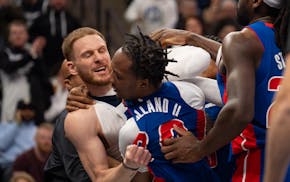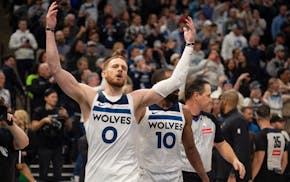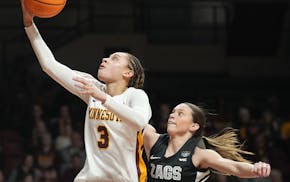It's worth wondering if the Twins' restructured front office, with Thad Levine gone, Jeremy Zoll replacing him as general manager, and Derek Falvey now in charge of both the business and baseball side of the franchise, might differ in how it approaches the roster-building process.
For instance: Could the Twins make news at the winter meetings?
Their history says no.
Baseball's annual convention — part job fair, part negotiating platform, part social engagement — gets underway Monday in Dallas, the first chance for Zoll to mingle in person with his new peers. And while the four-day meetings could create some huge headlines once Juan Soto chooses a team and other players find new homes at less-stratospheric prices, don't expect any free agents to pose in a Twins jersey at a contract-signing ceremony.
Not that they won't be meeting with agents anyway.
"It's always fun to enter this portion of the offseason and really dig in on baseball conversations," Zoll said in late November, after his promotion was announced. "The way our roster projects, even without making any moves, is certainly really encouraging and exciting. But we can't rest on that. We have to find a way to keep putting ourselves in the best position possible."
It doesn't usually happen in early December, though. This will be the eighth time that Falvey has attended the winter meetings as the Twins' chief decisionmaker — the 2020 winter meetings, also scheduled for Dallas, was canceled by the pandemic — and only once has the team announced major league additions while there.
That came in 2017, when on consecutive days, Falvey signed pitchers Michael Pineda, who had undergone Tommy John elbow surgery earlier that year and would not pitch in 2018, and Fernando Rodney, who was traded the following August.
Still, teams meet with plenty of agents and swap ideas, if not necessarily players, with other teams while together at the same venue. Most of the Twins' major trades and signings of the past few years were discussed in early December, and acted upon in January and February.
"Teams come at us all the time," said Falvey, who has pulled off major trades in each of the past two Januarys, dealing Jorge Polanco to Seattle in 2024 and Luis Arraez to Miami a year earlier.
It's a little trickier this year, since the Twins, who still have eight arbitration-eligible players unsigned for 2025 but likely in line for substantial raises, want to keep their payroll close to the $130 million level it was at in 2024.
"Everyone is always going to ask, when you're a team in the payroll bracket that we are, 'How do you gain flexibility and what does that look like?" Falvey said. "Obviously we'll need to be creative around how we make our roster work and fit together."
It's possible that next week's biggest news for the Twins won't be a result of their own actions. On Tuesday, MLB holds its third lottery to set the draft order for the first six picks in next July's amateur draft, and the Twins, who finished with the 12th-worst record in MLB at 82-80, have a 1.09% chance of capturing the overall No. 1 pick and roughly a 7% chance of moving into the top six.
Those odds may sound long, but the Twins hit similar odds in 2022, moving from the midteens to No. 5, where they selected outfielder Walker Jenkins, now rated by most scouts as one of the team's top three prospects. The Twins already learned last week that they will also choose in the mid-30s overall with a "competitive balance" pick.
On Wednesday, the Twins will learn if they will lose any of their fourth- or fifth-year prospects in the Rule 5 draft, where teams are allowed to claim veteran minor leaguers who are not on a major league 40-man roster. The Twins have not lost a player in the draft since outfielder Akil Baddoo and pitcher Tyler Wells were selected in 2020.
The Twins hold the 14th pick in this year's Rule 5 process, but have not made a pick — which requires the drafted player to remain in the majors for the entire following season — since choosing pitcher Tyler Kinley from the Marlins in 2017.

Wolves bounce back from second-quarter brawl to blow out Pistons 123-104
Twins swept by Cardinals to begin season as Bailey Ober stumbles in opener again

Souhan: Wolves, Edwards belatedly wake up following skirmish
Moore and Rinzel each make their NHL debut with the Blackhawks
